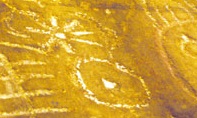In tragedy, in epic, in comedy, in poetry, the soul twists and turns, waiting for the gyration which will produce happiness. The soul is a great republic which needs its benign rulership. Plato wanted to ban poetry from his ideal republic. This wasn't because it was disturbing or subversive but because it stood, in his view, three stages removed from truth itself. He saw it as an imitation of an imitation of the real. We may be indignant at this proposal to banish something which - in our estimation - enriches life, but on the other hand we might also be able to admire a worldview which has at its heart such a pure vision of virtue and truth that everything else must seem like unenlightened agitation.
There is certainly something in this. Nine tenths of life is played out on the level of drama which might or might not yield self-awakening. It's almost impossible to conceive of one's own life in terms of genuine enlightenment or a vision of the good. But the moment comes in the midst of it all when a clear light appears - fleetingly - before the inner eye. In that second the light works retrospectively and illumines all those gyrations of destiny which lie in the past. The way I see it is this: the moment of light is like the end of a giant archway which reaches up into the sky, into the past, disappearing for a time, but having its other end at a point in some distant epoch - perhaps in the time of Plato or some other period of particular importance to your soul. This presumes, of course, that the soul has existed prior to birth and has probably enjoyed (if that's the right word) many other lifetimes. In other words there is a clear true path, symbolized by light, overarching all of our existence.
In this sense poetry, tragedy, comedy, epic are all expendable. The truth which illumines our existence is all-important. It's like the light which reaches down and floods the dark streets of our soul with radiance. The republic of the soul.
Jay
© Landar 2012. All rights reserved
Picture: The School of Athens, by Raphael
You are welcome to quote from PageLight on the condition that you cite the author and the source:
Author: Jay Landar
Source: www.pagelight.blogspot.com
For other permissions please contact the author.






